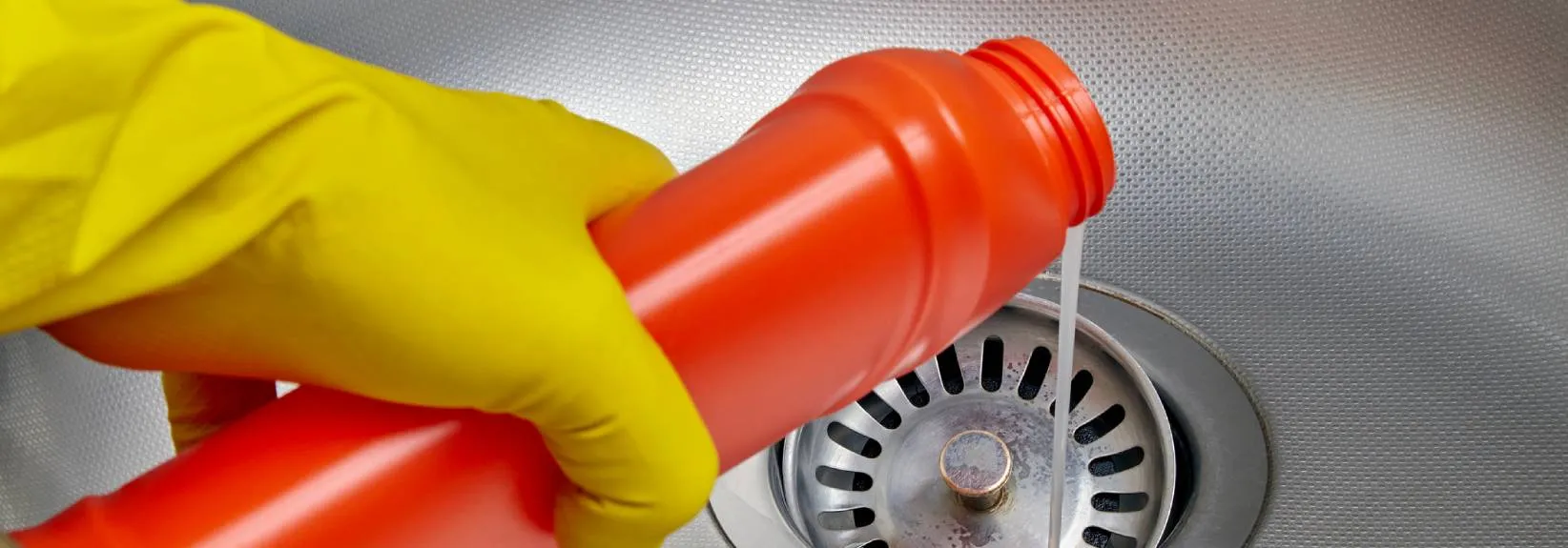Unblocking a blocked drain can be nasty work, so many homeowners use chemical drain cleaners to wash away the crud. Bottles of these products are often found in cleaning closets, but are they completely safe? Dive into the world of chemical drain cleaners, see how they actually clear blockages and learn why they’re hazardous. Then, explore some safer alternatives for removing debris from clogged drains without chemicals.
What are Chemical Drain Cleaners Used For?
Chemical drain cleaners are primarily used for clearing plumbing blockages. They appeal to homeowners because they’re fast, straightforward to use and offer effective results—at least at first. These cleaners are available in liquid, gel or powder form and break down hair, grease, food and other substances blocking the drain. They are often advertised as an easy and convenient solution to tackle stubborn clogs and are sold at grocery stores, hardware stores and big box retailers.
How Do Drain Cleaners Work?
The specific reaction that happens within the pipes will depend on the type of drain cleaner being used. Here are several examples:
• Acidic drain cleaners contain sulfuric, muriatic or hydrochloric acid. This reacts with organic materials to create heat and gas, dissolving the clog. Acidic cleaners are very successful against hair clogs but must often be used more than once or in high concentrations to do the job.
• Oxidizing drain cleaners contain bleach, peroxides or nitrates, which are substances that release oxygen when dumped into the drain. Oxidation breaks down organic matter and clears clogs from the pipes while killing bacteria. As a result, oxidizing cleaners work very well against easy-to-break-down materials like food.
• Caustic drain cleaners contain lye or potassium hydroxide, which generates heat to break down and break up materials clogging the drain. The caustic traits of these cleaners allow them to dissolve fat, grease and other organic items.
• Enzyme drain cleaners don’t contain chemicals. Instead, they break down organic material using bacteria or enzymes. However, they take more time to remove blockages than chemical drain cleaners due to the fact the bacteria or enzymes must have time to multiply. For this reason, enzyme drain cleaners are a good choice as a precautionary measure rather than a rapid drain-cleaning remedy.
Is Drain Cleaner Safe?
While chemical drain cleaners are reasonably effective, they do have risks. Here are a few key issues to consider:
• Chemical drain cleaner is bad for pipes. The heat produced by caustic and acidic drain cleaners can inflict damage on pipes, especially older or plastic ones, which can become weak and crack with time. Frequent use of these cleaners can cause expensive repairs or replacements, as damaged pipes are more likely to leak or rupture.
• Chemical drain cleaner can injure your family members. The highly toxic chemicals in drain cleaner can trigger respiratory issues if inhaled, very bad burns if touched, blindness if rubbed into the eyes or digestive problems if ingested. Therefore, drain cleaner must be used with great care.
• Chemical drain cleaner is harmful to the planet. Dumping chemicals in the drain transfers toxic substances to local waterways, disrupting ecosystems, harming aquatic life and causing other environmentally harmful impacts.
Safer Alternatives to Drain Cleaner Chemicals
Fortunately, chemicals aren’t the only choice for clearing clogged drains. Here are a few safer possibilities to consider:
•
Dish soap and hot water: Adding hot, soapy water to a slow drain helps break up grease and washes away slight blockages. The soap acts as a lubricant and emulsifier, while the hot water dissolves and washes out the clog. This tactic may call for a number of attempts, but it’s safe and non-toxic.
•
Plunger: This manual drain-clearing approach pushes blockages down the the pipe without harmful chemicals. Fill the clogged sink or tub with an inch of water to help create a tight seal over the drain opening. Then, make forceful, continuous plunging motions until the water goes away.
•
Drain snake: Also called a plumber’s auger, this tool features a flexible cable with a corkscrew on the end. When inserted into the drain, the snake physically breaks up and removes obstacles. This method is highly effective against difficult clogs without doing any damage to the pipes or posing health risks.
•
Hydro-jetting: This professional service uses high-pressure water to blast away debris and obstructions, delivering a thorough cleaning that keeps future clogs at bay. Hydro-jetting requires a professional plumber’s assistance, but it’s the most efficient, long-lasting answer for even the most challenging clogs.
Schedule Professional Drain Cleaning Services
While chemical drain cleaners provide a quick remedy for slight clogs, they pose too many risks. Consider using safer, chemical-free choices to protect your pipes, your family and the environment. If your DIY attempts prove fruitless, turn to Enercare Rob's Albertan for
professional drain cleaning services in Edmonton. We’ll get your drains clear once again and suggest tips to prevent clogs from returning. Our plumbers are ready to help, so call
a Service Experts office near you today!



